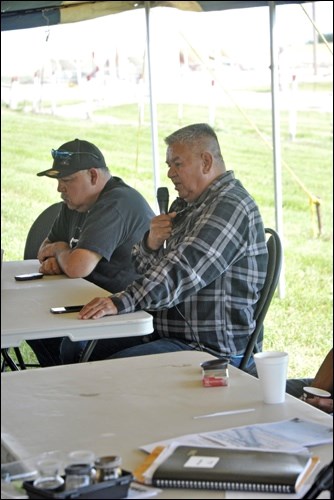Local First Nations representatives made their thoughts known Thursday about the impact of the Husky oil pipeline spill on their communities.
They held a forum called "Is moving oil by pipeline safe? 2016." It was chaired by Rod Gopher and co-chaired by Little Pine Chief Wayne Semaganis. The meeting was billed by organizers as fostering the "participation and dialogue of various stakeholders" including governments, First Nations and oil companies.
The gathering ended up airing a host of concerns and grievances about the oil spill and its impact on Aboriginal communities, as well as on wildlife and plant life in and around the river. There was also a focus on next steps for First Nations.
But the gathering also sought answers from officials about the spill. Those weren't forthcoming on this day.
Listed on the published agenda for the forum were presentations by Husky Oil officials and also from Premier Brad Wall. But in speaking to reporters Wednesday at City Hall in North Battleford, Wall said he was not going.
It wasn't just Wall – no provincial government representative showed up. Husky Oil wasn't there, either.
"I was hoping one of the provincial people would be here to explain exactly what took place," Gopher said to the microphone. In particular he said he wanted answers to discrepancies in some of the information about the spill into the North Saskatchewan River. Gopher noted initially the spill was reported to be 200,000 litres but that number later increased to 250,000 litres.
Onion Lake Chief Wallace Fox later said he was not surprised Wall was not there.
"That's the last thing on their agenda – First Nations people and indigenous people," he said.
With Husky Oil and government officials not participating, there weren't many answers to be had for the gathering of over 40 people at a tent set up outside the White Rock Gas Bar.
In attendance were mainly leaders and residents from First Nations, as well as environmental activists and additional supporters.
A few First Nations, including Little Pine, were directly affected because of their proximity to the river. Little Pine chief Semaganis expressed frustration with the lack of communication between oil and government officials with their people on the whole situation.
"There's a lack of information going out, not just to First Nations but the community at large," Semaganis said, in speaking to reporters. "And we know from being at ground zero at the spill site that what's coming out in the media is not the full story, it's not even half of the story. We're being actively kept away from accessing that information."
He pointed to invitations to oil and provincial government leaders to meet with them that went ignored.
"We want to be involved, we care about the environment," said Semaganis.
FSIN Chief Bobby Cameron was in attendance and spoke about the importance of the river to the daily lives of First Nations people. He used to live in the area and spoke of going to the North Saskatchewan River with his dad to catch fish.
"Now the oil spill has created havoc and caused trouble for our Indian people," said Cameron.
He also claimed the actual number of wildlife impacted was much higher than reported, saying it was actually thousands of fish impacted.
Saulteaux chief Kenny Moccasin noted the impact for people on his own First Nation who hunt and fish. He complained of "no consultation for our people. It's pretty frustrating."
A key issue for those in attendance was the need for tougher environmental regulation. Gopher decried the reliance of the oil industry on self-regulation.
"Industry is judge and jury," said Gopher of the situation.
Among the initiatives they spoke about was potentially setting up a $150 million Environmental Protection Fund, funded one third each by industry, the federal government and the provincial government.
There was also talk of proceeding with litigation. Semaganis said they have no choice but to go that route.
"We have no choice, because where are they now?" said Semaganis. "They should be here working with us to address these things."
A protest march also took place at 2:30 p.m. from White Rock Gas Bar along Highway 4 all the way to downtown North Battleford and to the North Saskatchewan River.




